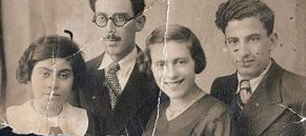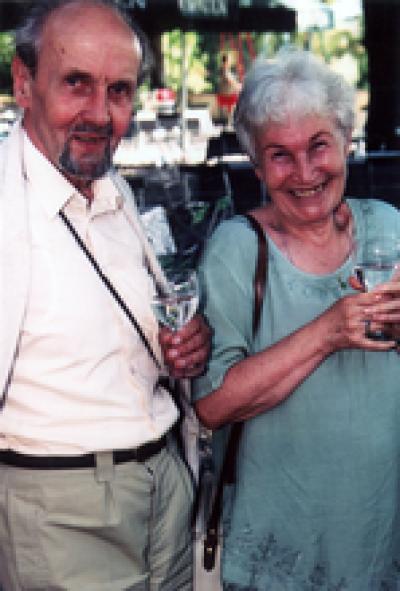From the Centropa Biographies - Ruth Halova

Ruth Halova
Born 1926 in Český Krumlov
Country: Czech Republic
City: Holubov
Interviewer: Lenka Koprivova
Date of interview: July 2006 - March 2007
One fall day in 1938, I went to school as usual. I entered the classroom, sat down and began to take things out of my briefcase. But my classmates began chanting the slogan 'Juden raus!,' 'Jews out!,' so I stacked my things nicely back into my briefcase, and my Jewish friend Leo and I left the class. We were the only two Jews in the class. I remember telling him in front of the school: 'The worst thing about it is that now we'll stay dumb forever, as we can't count on any more education.'
I was in sekunda [second year of an eight-year high school, or Grade 6] when I was forced out of school. My sister was even worse off; she was in her last year. We spent the next few days at home, and couldn't even go out into the street - young Germans, the Hitlerjugend were marching around outside, and you wouldn't have met a decent person in the street. But my brave mother kept on going to work. One day, still at the beginning of September, she returned and said that we were to pack up some necessities, because we could no longer remain in Krumlov. She ordered a taxi, and sent us to Protivin, her hometown north of the Sudeten border. She herself remained in Krumlov, saying that she'd try to pack up our household.
A couple of days later, our home became part of the German Reich - Czechoslovakia was forced to accept the humiliating agreement, and give up its border regions. To this day, I remember the tears in the eyes of the soldiers, who were mobilized, but then recalled again, and didn't get a chance to defend their homeland.
In Prague I began attending school again, while my sister didn't continue her studies. But soon my school attendance was once again interrupted - on 15th March 1939, a sign appeared on the school gates that there was to be no school until further notice. The Germans had arrived - Czechoslovakia was occupied.
With the passage of time, my mom's face grew more and more serious. I don't know where, but somewhere she'd managed to find out that someone was helping Jewish children get into foster families in England. And so she took my sister and me to an office on Vorsilska Street to register us, then we stood in a long, long queue for passports, and on the last day of June I was leaving Wilson Station towards an unknown fate. I had the luck that one English family had decided to take me in. My sister also managed to get into England, and went in the following transport: in the last one to leave Czechoslovakia.
Mom didn't have to explain much to me before the trip. After all, I was already a big girl, and knew that the situation was serious. During the train trip, I also felt that at the age of 13, I belonged to the older ones in the transport, and should therefore help take care of the younger children - the two women the Germans had allowed to come with us couldn't keep up with caring for 250 children. In the compartment where I was sitting, there was also one toddler. Before we left, his mother had stuck a bottle of milk for him through the window to us. I took it and put it on the bench, but when the train started moving, the bottle fell over and the milk spilled. For the rest of the trip we fed the little tyke chocolate that we'd all been given for the trip.
When we were crossing the German border, we stood still at it for a terribly long time. The wait seemed endless to us, and we began to be gripped by fear. German uniforms were walking around the train station, and from the faces of the adults and fragments of conversations, we realized that some important documents weren't in order, or perhaps were even missing. Somehow it was all cleared up, the train once again began moving, and after long, endless hours we arrived at Hoek van Holland [Hook of Holland] harbor. We boarded a ship, and when I climbed up on the top bunk in the cabin, I was terribly afraid that I'd fall off it in my sleep.
On 1st July we arrived in London. It was by coincidence my mother's birthday. Before our foster parents took us our separate ways, we were sitting in this large, green room, maybe a gym. We had name cards hanging around our necks, and I clearly remember my feelings, not so much of sadness or tragedy, but of absolute helplessness. This is how calves must feel, when they're separated from the nourishment and protection of their mothers, put in human hands and at the mercy of human beings, I said to myself.
When I was still back home in Czechoslovakia, I'd received a letter from the couple whom I was supposed to live with. So I knew that I was going to be living in Birmingham, with the Joneses. Unfortunately they didn't manage to pick me up in London, so a young man came over to us and said: 'Come along, young people, I'll take you to the train and your families will pick you up in Birmingham.' It was only years later, when I met him again, and knew who he was, that I realized that this young man had been Nicky Winton.
The Joneses were a very kind, older pair. They lived in the suburbs of Birmingham, where they ran a newsstand that also sold all sorts of sweets and ice cream. Aunt and Uncle, as I called them, were very kind to me, and used to give me as much ice cream as I wanted. Another consolation for me was that the Joneses had a female German shepherd named Peggy at home. I could speak Czech to her, and she was the only one that understood me, even if no one else did.
Even though I'd studied some English basics before departure, my knowledge was far from sufficient. And so I didn't understand Englishmen at all, and they didn't understand me. When the Joneses noticed how fond I was of Peggy, our home menagerie grew even bigger: a kitty and a budgie joined it. Another person who tried to make my melding into the new environment as easy as possible was the butcher's helper from the store next door. We were about the same age, and whenever he noticed my tears, he sat me in the sidecar of his motorcycle amongst the sausages and meat, and drove me around. He was also my first English teacher, and my English soon came to resemble his. The problem was that he had a strong Birmingham accent, which of course I didn't know, so my style of speaking must have chafed sensitive ears.
I liked it at school, and I quickly made friends with my classmates. My English surroundings behaved very kindly towards me, and in all manner of ways tried to help me get used to the new environment. Despite that, I had big problems with it. I had problems getting used to England, and upon my return, to once again get used to Czechoslovakia. What bothered me a lot in England was that form was emphasized over content. Everyone says 'sorry,' while they're not at all sorry. Also the sentence 'That's not done' always irritated me greatly, and I couldn't get used to it.
When my first school year in England was drawing to a close, my compulsory school attendance was also drawing to a close. Was this to mean the end of my further education? I didn't want to accept the fact that for the rest of my life I'd be as dumb as I felt myself to be back then. The Joneses were planning to set up a little business for me in this little shop, where I'd sell cotton, wool and silk, and teach people to knit, crochet and embroider. I'd actually always liked handiwork, but the notion that all my life I'd just sit and embroider, or perhaps sell wool? Luckily, a solution was found.
The Joneses wouldn't have had the money to support me in some high school. Mrs. Evelyn Sturge managed to find the finances; she actually wasn't a Mrs., but an older unmarried lady, who used to visit us emigrant children from time to time to see how we were doing. Once she simply arrived, asked how things were, then stopped by at my school and then left again. A few days later a message arrived that I'm to move from Birmingham to Rugby, and that I'd be attending high school there!! It's very moving to recall a person who made this possible for me.
I completed my studies at Rugby High School with an exam called the Oxford School Certificate. I of course tried to find work as soon as possible. My priority was work in a laboratory; I sent an application to several dozen of them, but with no success. It was wartime, and state institutions weren't allowed to employ foreigners. And so I started working at a local drugstore.
We didn't have much information about what was happening at home. Despite that, we suspected that it wasn't anything nice. We were all living in uncertainty, as to what fate had befallen our loved ones, and to this day I remember the day when I found out about my mother. It was one of the most joyous days of my life. At the school they gave out mail during lunchtime in the cafeteria. One May day I received a postcard written in pencil and with the first Czechoslovak stamp in six years. It was from one family friend who'd returned to his homeland as a soldier right after Victory Day, and met my mother in the Jewish ghetto in Terezin.
My boldest hope had been fulfilled, my most fervent prayer had been answered. I lived through the next several weeks that separated me from my repatriation on 25th August and the subsequent reunion with my mother on the platform of the Usti nad Labem train station in some sort of trance, as if I was floating on a rose-colored fog of joy, and my feet were barely touching the ground.
My mother survived, working as an X-ray technician in Terezin, and this thanks to her cousin Arnost. Arnost was an engineer, and was responsible for the Terezin water plant. You see, they'd hidden the fact that they were cousins, and they got married in Terezin. Thanks to this, my mom remained in Terezin and didn't go any further onwards.
With a feeling of patriotic pride, I registered as a student of the Faculty of Sciences at the old and famous Charles University in Prague. The field I'd picked was, what else, microbiology. And to this day I'm convinced that it was the right choice; it's a beautiful field, it's so exciting, it's interesting, and a very suitable profession for a woman.

Ruth Hálová with his husband Milan Hálá in India
